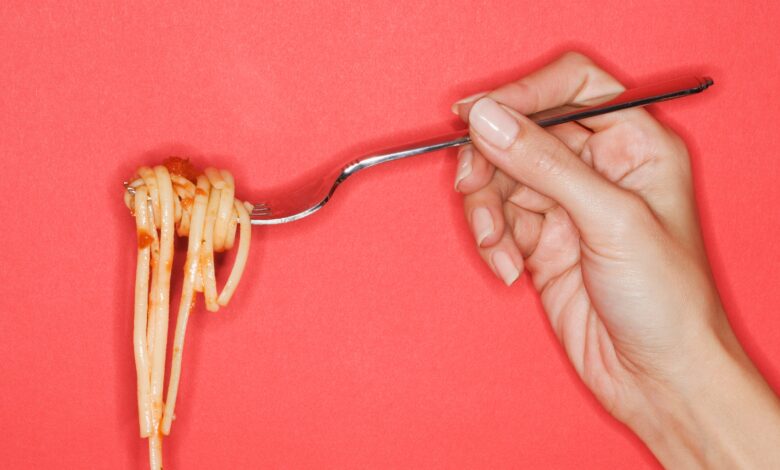9 Signs That You’re Not Eating Enough Carbs

The world of heathy eating is a bit like a Marvel comic, where protein is cast as the superhero and carbohydrates the shady villain. Not eating enough carbs continues to be seen as a good thing, with bread—and even fruit—being demonized by some “health” enthusiasts.
That rocky relationship with carbs can be traced back to ‘80s diet culture, with many of us still internalizing the belief that cutting out carbs will make us lose weight faster. The current popularity of the low-carb keto diet—where your total carb intake is 50 grams per day (the equivalent of half a medium-sized bagel)—may have something to do with it, too.
There is a tonne of fake news out there about carbs, so what exactly are they? Put simply, carbohydrates are one of the three main building blocks that make up all food (protein and fat are the other two).
Described as “macronutrients,” we need all three of these nutrients in larger (macro) quantities to provide us with energy. “Carbs serve as your main source of energy, fueling both your brain and muscles,” notes nutritionist Riya Lakhani-Kanji. “That’s why it’s crucial to include healthy, complex carbohydrates in your meals instead of trying to eliminate them altogether.”
Simple vs. Complex Carbs
It’s their makeup that muddies the waters. According to Clarissa Lenherr, gut health and IBS nutritionist, “carbohydrates are composed of sugar molecules that are arranged as either simple or complex carbohydrates.” These can be broken down as follows:
Simple carbohydrates: This can refer to naturally-occurring sugars found in fruit (fructose) and milk (lactose). But, confusingly, this also refers to refined and processed sugars in sweets, cakes, soft drinks and white pasta.
Complex carbohydrates: These are your whole grains (whole-wheat bread and pasta, oatmeal), pulses and starchy vegetables. “Good sources include quinoa and brown rice, as well as fruits such as apples and bananas,” says Lakhani-Kanji. “And don’t overlook veggies like sweet potatoes and broccoli—these are also great sources of complex carbohydrates and offer tonnes of nutrients.”
Kuvona
Are carbs unhealthy?
Ah, the million dollar question: Are carbs unhealthy? The answer is nuanced.
As a food group, carbs are not unhealthy, per Lakhani-Kanji. “They are actually essential for a balanced diet,” she says. That said, she also adds that “it’s important to understand that not all carbs are the same, and this affects how they fit into a healthy diet.”
While it might be tempting to think of some foods as “good” and others as “bad” because of the total amount of carbohydrates they contain, in reality it’s not that straightforward.
Fact: whatever the food, your body breaks down its carbohydrates into sugar that ends up in your blood steam. But what is key is how rapidly that happens and whether that carb-rich food has other nutritional benefits.
Take a banana, for example. It is a fruit that contains one of the highest amounts of carbohydrates (the equivalent of around 10 small gummy bears). But it is also a complex carb that is rich in heart-healthy potassium and fiber for digestive health.
Simple carbs like gummy bears aren’t “bad” exactly (food has no moral value and we would never guilt trip you about having a sweet treat). But they also won’t ever nourish your body in the same way that a complex carb can.
It’s an important distinction to make, according to Lenherr, as not all carbs are empty calories. “Whole sources of carbs like fruits, vegetables, whole grains and pulses are rich in fiber, vitamins, minerals, and antioxidants,” she says.
Basically, the good stuff that helps your body to thrive. Plus gram for gram, starchy complex carbs contain fewer than half the calories of fat.
Another problem with sugary simple carbohydrates, notes Lenherr, is that “they are rapidly digested, leading to rapid increases in blood sugar levels.” So it’s best to eat them in moderation to lower your risk of diabetes, obesity, heart disease and high cholesterol.
Conversely, complex carbs “are made up of longer chains of sugar molecules, making them slower to digest,” she adds. “They provide a more sustained release of energy.”
Crucially, starchy complex carbs are also high in fiber. “Fiber is vital for good digestion; it helps everything move smoothly through your gut and supports a balanced gut microbiome,” Lakhani-Kanji says. “On top of that, fiber plays a role in regulating blood sugar levels, which can lower your risk of developing cardiovascular diseases.”
How many carbs should we be eating each day?
As for the amount of carbs we should be eating every day, it’s definitely not zero. The NHS recommends that starchy complex carbs–potatoes, brown bread, brown rice and wholewheat pasta–make up just over a third of the food you eat (unless you have type 2 diabetes, in which case it’s important to speak to your doctor about managing your blood sugar levels).
According to the British Heart Foundation, a portion of starchy complex carbs for one meal should be about the size of your fist.
Signs that you’re not eating enough carbs
The long-term effects of limiting your carb intake is still unknown. But the Mayo Clinic cites having too few of some vitamins and minerals, or having digestive issues, as possible consequences for your health.
Here are some of the most common side effects of slashing or eliminating carbs from your diet:
1. You frequently feel tired
Carbohydrates energize your body and fuel your muscles (it’s one reason we often crave carb-rich comfort food in winter as our bodies burn more energy to main their core temperature). So it follows that curbing your intake could leave you feeling sluggish.
Much of this has to do with how carbs are converted in the body. After being broken down into simple sugars, they are “absorbed into the bloodstream, where glucose becomes fuel for the body,” Lenherr, explains. “Insulin helps cells take up glucose for energy or stores it as glycogen in the liver and muscles.
“When your carb intake is too low, glycogen stores are quickly depleted, leaving the body with less readily available energy,” she continues.
Cue your body has to work harder to convert energy from the protein and fats you consume, and weakness– dubbed “keto flu“— sets in.
2. Your workouts feel tougher
This also explains why you may feel weaker when working out as carbs fuel your muscles and muscle contractions.
“Another important benefit of carbs is that they help your body to preserve protein,” says Lakhani-Kanji. “When you consume enough carbs, your body can use protein mainly for repairing and building muscle rather than relying on it for energy. This is crucial if you’re aiming for muscle growth or trying to stay fit.”
3. You’ve got brain fog
Carbs also fuel your brain. “When you eat carbs, your body breaks them down into glucose, which is what your brain uses to function properly,” says Lakhani-Kanji. “The brain doesn’t have a way to store glucose, so it relies on a continuous supply of it through the bloodstream.
“If you’re not getting enough carbs, your body can struggle to supply the glucose your brain needs,” she continues. “Essentially, without enough energy from carbs, you might find it hard to concentrate, think clearly, or stay focused on tasks.”
In one study, women were divided into two groups: one group followed a strict low-carb diet, while the other group ate a balanced diet. Cognitive tests were taken at various points—before starting the diets and again after 48 hours, one week, two weeks and three weeks.
“The results showed that those on the low-carb diet didn’t perform as well on memory tasks compared to the balanced diet group,” Lakhani-Kanji notes. “Interestingly, once they reintroduced carbs, their memory improved, showing just how important carbs are for brain function.”
4. You’re feeling bloated
“Many carbohydrate-rich foods, particularly whole grains, fruits and vegetables are high in fiber, which is essential for gut health,” says Lenherr. “When you reduce your carbohydrate intake, you often decrease your fiber consumption.
“Fiber plays a crucial role in promoting regular bowel movements, so without sufficient fiber, you may experience constipation. This backing up in the digestive system can result in gas and bloating.”
Another culprit may be low-carb or low-sugar alternatives. “These can sometimes have artificial sweeteners or sugar alcohols, which—if consumed in excess or by those with sensitive stomachs – can cause side effects such as bloating,” adds Lenherr.
Jacob Wackerhausen
5. Your weight is yo-yoing
Yes, you can lose weight when you slash your carb intake. But this is mostly water weight as carbs are stored in the muscles and liver as glycogen, which binds with water. “This loss reverses once carbs are reintroduced into the diet,” adds Lenherr.
“Lots of people also assume that eating carbs make you gain weight but this is generally a result of consuming more calories than the body needs, regardless of the source,” Lenherr says. “Carbs only contribute to weight gain when eaten in excess”—if you eat more calories than your body can burn off, the excess will be stored as fat in your body.
6. You’re still hungry after a meal
“When you’re not eating enough carbs, your body quickly begins to crave more energy, which can make you feel hungrier,” says Lakhani-Kanji. “Carbs are one of the main sources of energy for your body so, when they’re low, your blood sugar can drop.”
This drop then sends a signal to your body that you’re hungry, “almost like a warning to eat something to get those levels back up,” Lakhani-Kanji adds. “Low-carb diets also affect hunger hormones like ghrelin and leptin. This means that when you’re on a low-carb diet, you might have a harder time recognising when you’ve had enough to eat, leading to even more cravings and possibly overeating later.”
Eating a healthy ratio of complex carbohydrates alongside a portion of protein with each meal can slow down your digestion and make you feel fuller for longer, as well as being a stable source of energy.
7. You suddenly have bad breath
Those who follow a keto diet, or severely slash their carb intake, often suffer from bad breath. This is because your body enters a state called ketosis. Without carbs for fuel, it starts to break down fat into ketones for energy—and ketones have a certain unsavory whiff about them.
8. You keep craving sugary treats
“When your carb intake is insufficient, the body may experience drops in blood sugar levels,” Lenherr notes. “To compensate, your body sends signals to crave quick sources of energy, like sugary foods, which can provide a rapid boost in glucose.”
9. You often suffer from headaches
“When you significantly reduce your carb consumption, your blood sugar levels can drop, which may trigger a migraine or headache,” says Lenherr. “If you are on a very low carb diet like the keto diet, one of the common side effects when transitioning is headaches. It is suggested that this is partly down to low blood sugar and partly down to potential dehydration.”
Delicious ways to eat more complex carbs
Incorporating complex carbs into your meals can be both quick and nutritious, Riya notes.
“You can put together whole grain quinoa tossed with roasted vegetables or a fresh bowl of barley salad mixed with chickpeas and a variety of colorful veggies,” she says. “You could also enjoy sweet potato wedges seasoned with herbs alongside a steaming bowl of lentil soup. For breakfast, try a bowl of oats topped with fresh fruits and a sprinkle of nuts for that energy-packed start.”
This article was originally published by Glamour UK.




